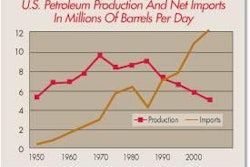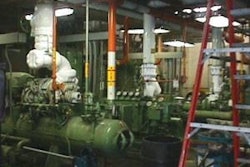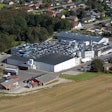Republicans like it. Democrats like it. National, state and local leaders like it. But on a wintry evening in January as President Bush addressed the nation and talked about our biofuels policy, around 30 poultry producers from around the USA and the world gathered in an Atlanta hotel to assess just how bad things may get. Words like "delusion" and "train wreck" figured prominently in their discussion of the government's biofuels policy and its likely ramifications on the poultry industry.
How do corn prices between $4 and $6 a bushel spiking to $8 a bushel strike you? That is the scenario projected by poultry industry economist Paul Aho for the 2007-08 crop year. And his predictions assume a record harvest; the price scenario could be worse, he says, if weather conditions were to depress corn production.
Ethanol plants are springing up around the country and using more and more corn, as a result of government policy that not only subsidizes ethanol production but requires its use. The producers who gathered in Atlanta to hear Dr. Aho's outlook expressed a mixture of bewilderment and resignation over a national policy destined to drive up food prices while netting only modest energy savings for the country.
"The problem that I see is that even if the entire U.S. corn crop were to be used for ethanol production it would replace less than 20 percent of gasoline use in the USA," Dr. Aho told listeners. "Realistically, not all of the corn crop will be used in the production of ethanol, and ethanol will replace about 8 percent of U.S. gasoline usage at best."
While there is controversy about whether ethanol production is net energy positive or negative, Aho said that using even the most optimistic claim that ethanol production is net energy positive by 25 percent would yield only a 2 percent reduction in energy use. "And the increased ethanol production is going to be at the cost of significantly higher feed grain prices and food prices around the world," he noted.
So, what's the impact on the poultry industry? Aho calculates the growing ethanol production in the USA will increase the cost of production of a pound of whole ready-to-cook poultry meat by 4.5 cents and a dozen table eggs by 10 cents. Increased cost to the U.S. poultry meat industry will be about $2 billion a year. Increased cost to the domestic table egg industry will be $750 million.
Worldwide, he estimates, the increased cost to the poultry meat industry will be $8 billion, while the increased cost to the table egg industry will be $9 billion.
"Worldwide, just for poultry and eggs, there will be a $17 billion increase in cost to consumers, at a minimum," Aho said. This doesn't count the increased costs of other foods that use grains in their production, like pork, beef, bread, tortillas, etc. The additional price tag, including those foods, might be close to $100 billion, he figures. The resulting price increases will work to depress poultry consumption around the world, he said.
Won't corn producers be able to increase production to soften the impact on corn prices? Some say that corn yields and acreage will increase dramatically and mitigate the diversion of corn to ethanol production. Aho is skeptical of this occurring in the short term. Land in the Conservation Reserve Program usually is set aside under 10-year contracts, and only a small percentage becomes available for production in a given year. Also, the productivity of land diverted from other crops to corn is often relatively low. What's more, the amount of corn being diverted to ethanol production is huge and growing. "This year, the percentage of the U.S. corn crop that's dedicated to ethanol production is about 20 percent. By next year that amount will be 30 percent, and it will be close to 40 percent in the following year," he said.
For now, critics of the nation's love affair with corn-based ethanol production may feel like the small child in the Hans Christian Anderson fairy tale who could clearly see that the emperor had no clothes. The trouble is by the time others admit that our nation's biofuels policy makes no sense, the entire world will have paid a high price.



















